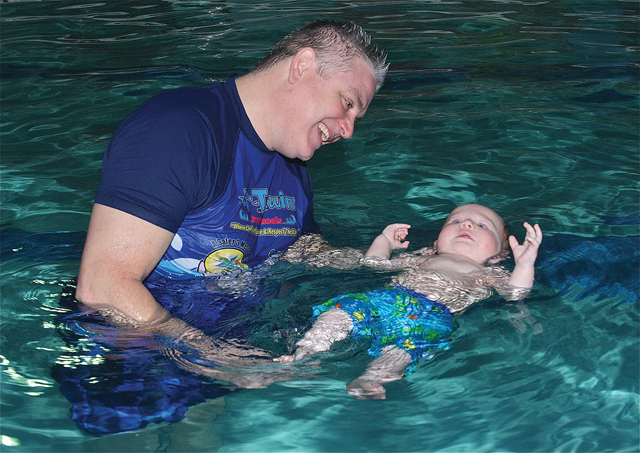Health Column: Kids can get an early start on swimming


Not long ago, I was scrolling through my Facebook news feed when I came across a photo of my year-old niece attending her first swimming lesson.
“Aww, that’s cute,” I thought. “But can a baby really be taught how to swim?”
To my surprise, the answer is yes.
“A baby is in water for nine months of their lives before they’re born,” pointed out Bobby Hazen, district manager of Saf-T-Swim and an instructor at the company’s Riverhead location. “They have a tremendous amount of natural instincts toward water.”
According to Mr. Hazen, who is also founder of the nonprofit End Drowning Now, babies as young as 2 months old have the ability to rotate in the water and float on their backs. They also don’t begin to associate water with fear or anxiety until they’re around 8 months old, he said.
“If a baby starts swimming young — whether they’re 2 months, 5 months or 7 months old — they don’t know any better,” Mr. Hazen said. “They’re not afraid.”
Until recently, the American Academy of Pediatrics advised against giving swimming lessons to children between the ages of 1 and 3 because “there was little evidence that lessons prevented drowning or resulted in better swim skills,” according to the organization’s website. AAP officials also worried that parents who gave swimming lessons to children under age 4 would develop a false sense of security.
But in 2010, when new evidence showed that children as young as 12 months were less likely to drown if they had formal swimming instruction, AAP softened its stance. Ever since, they have recommended leaving the matter to a parent’s discretion.
Brooke Costello of Rocky Point is one such parent who decided that swimming lessons were right for her 6-month-old son, Cameron.
“It’s important for everyone to know how to swim,” said Ms. Costello, who enrolled Cameron at the Riverhead Saf-T-Swim when he was 3 months old. Since then, he has learned to kick his feet and even swim under water with assistance.
“It’s definitely worth it,” Ms. Costello said.
Although babies and toddlers can have the ability to swim or even save themselves from drowning with proper lessons, Kathy Connelly, a swimming instructor at Strong’s Marine in Mattituck, said it’s crucial that adults never leave a child unattended in the water — no matter their age or skill level.
“Children can drown in [as little as two] inches of water,” Ms. Connelly said. “A child could get distracted by a bird flying by and forget to hold their breath [under water].”
Photo Caption: Saf-T-Swim district manager and instructor Bobby Hazen works with 6-month-old Cameron Costello of Rocky Point last week. (Credit: Barbaraellen Koch)
To learn more about water safety, visit enddrowningnow.org. To suggest a health column idea to Rachel Young, email her at [email protected].







